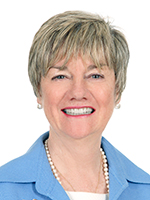Patricia M. Hynes, Esquire
2014 Professionalism Award for the Second Circuit

 Receiving the American Inns of Court’s Professionalism Award for the Second Circuit is only the most recent achievement for noted New York attorney Patricia M. Hynes, self-described “kid from Queens.” Having benefited from Hynes’s wisdom and influence in many venues, the legal profession can thank the nuns.
Receiving the American Inns of Court’s Professionalism Award for the Second Circuit is only the most recent achievement for noted New York attorney Patricia M. Hynes, self-described “kid from Queens.” Having benefited from Hynes’s wisdom and influence in many venues, the legal profession can thank the nuns.
Born and raised in the blue-collar neighborhood of Queens Village, Hynes attended a Catholic girls’ high school. The nuns recognized potential; they encouraged her involvement in the debate society and pushed her to apply to college. Their confidence, perhaps, ignited her ambition.
“When I looked around at the kids in my neighborhood, I knew I wanted to do something more,” she says.
Living at home, Hynes became a commuter student at the City University of New York, then tuition-free for city residents with good grades.
Despite graduating from law school in 1966 at the vanguard of gender integration, Hynes says she seldom felt that she was treated differently from her male counterparts. This was especially true in the U.S. Attorney’s office under Robert Morgenthau where, even as the only woman, Hynes found a welcoming environment: “I was treated like everyone’s little sister,” she says. Inter-departmental strife was kept to a minimum by the size and quality of the workload: “There were so many great cases; we didn’t have to compete to get good work,” she says. Quickly disproving the fallacy in the office policy that women weren’t tough enough to work in the criminal division, Hynes left the civil side and became a prosecutor. Fifteen years later, she went into private practice.
Hynes stayed at Milberg Weiss in various capacities from 1983 to 2006, and served as senior counsel at Allen & Overy from 2006 to 2014. She encountered no difficulty in crossing the aisle, saying, “Good lawyers understand the strengths and weaknesses of both sides of a case” and that “It was an amazing time for everyone.”
Hynes’s service and contributions to her chosen profession are numerous and profound. From May 2008 to May 2010, in addition to practicing law, she served as president of the Association of the Bar of the City of New York, an organization of nearly 24,000 members. She has also served in significant roles for the New York State Supreme Court, First Judicial Department; the Southern District of New York; and the American Bar Association. She has lectured and taught courses in trial advocacy at Fordham and Harvard law schools.
In 2003, Hynes took on a daunting challenge, becoming chair of the Board of Directors of the Legal Aid Society. “During the time I had served on the board, no one had ever mentioned that the society was having money problems,” she says. “But about 20 minutes after I became board chair, it was revealed that the organization was facing a deficit of $20 million” [and possible bankruptcy]. Hynes set herself to the task of a total financial turnaround, a task that she says occupied her full-time for nearly a year. She raised money from local firms, city council, and the City of New York; consolidated staff; downsized real estate; and implemented compensation and benefit reductions, all of which combined to enable the society to eliminate more than $40 million in debt. These heroic efforts earned Hynes well-deserved recognition in the form of the Citizens Union of the City of New York Robert F. Wagner, Jr., award for “contributions and exemplary leadership in strengthening the civic life of New York City.”
Throughout her career, Hynes has benefited from the wise advice of many mentors and has tried to deliver the same to young people passing through her orbit. It’s a mindset that she says began in the U.S. Attorney’s office so long ago, when experienced lawyers mentored junior associates in a sort of “buddy system.” She tries to perpetuate a similar approach, especially with her law students: “When I work with people, I always want them to know everything,” she says. “My students are so talented and refreshing, and everyone has wonderful ideas. It’s really interactive mentoring.”
Professionalism and civility are crucially important to Hynes, although she acknowledges encountering few miscreants: “Civility was stressed as important from early in my education. It makes lawyers much more effective and benefits the client. But in federal court, judges just don’t tolerate bad behavior; they don’t put up with any nonsense.
“If you’re not professional, you don’t belong in the legal profession.”
Jennifer J. Salopek is a freelance writer based in McLean, Virginia.
© 2015 American Inns of Court. This article was originally published in the May/June 2015 issue of The Bencher, a bi-monthly publication of the American Inns of Court. This article, in full or in part, may not be copied, reprinted, distributed, or stored electronically in any form without the express written consent of the American Inns of Court.